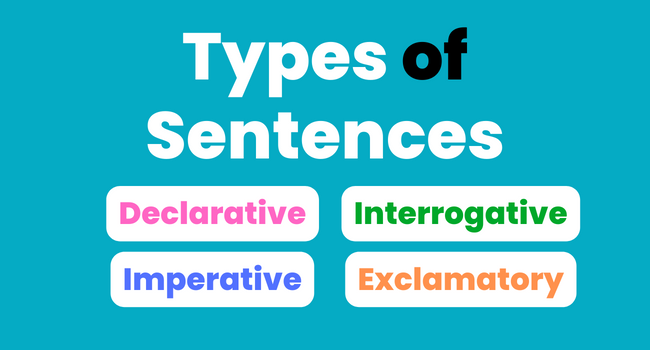
In today’s lesson, I’m going to talk about the four types of sentences. Sentence structure refers to the arrangement of words and phrases in a sentence, while sentence type refers to the purpose or function of a sentence.
In previous lessons, I talked about simple sentences, compound sentences, and other sentence structures. In this lesson, we’re talking about sentence type and purpose.
Declarative Sentences
Declarative sentences make statements or express information. They relay facts, opinions, or ideas. Declarative sentences end with a period (full stop in the UK).
Examples:
- Billy loves fishing with his dad.
- I’m going camping next weekend.
- It’s supposed to rain tonight.
- We have an exam next Monday.
These are all declarative sentences that express information and make statements.
Imperative Sentences
Imperative sentences give commands, instructions, or requests. They are used to tell someone what to do or what not to do. Imperative sentences often begin with a verb and end with a period or an exclamation mark. Oftentimes, they do not include a subject; the subject is implied to be “you”.
Examples:
- Please open the window.
- Bring your own beach towel.
- Stop talking during the movie.
- Don’t touch the hot frying pan.
These are all imperative sentences that give commands or instructions. We don’t need to say, “You, please open the window.” It is implied that the subject is “you”.
Interrogative Sentences
Interrogative sentences are questions. They are used to ask questions and seek information. They typically start with a question word or an auxiliary verb and end with a question mark. For example:
- What is your name?
- How are your grandparents doing?
- Do you like sushi?
- Will it rain next week?
Note: We do not end indirect questions with a question mark. For example, “I wonder how your grandparents are doing” would end with a period, not a question mark.
Exclamatory Sentences
Exclamatory sentences express strong emotions or surprise. They convey excitement, joy, anger, or any other intense feeling. Exclamatory sentences end with an exclamation mark.
Examples:
- This pasta is absolutely delicious!
- I can’t believe you’re engaged!
- Ben just got a promotion!
- You are not listening to me!
These sentences could end with periods, but they would not express the same level of emotion. Using an exclamation mark makes these sentences more emotive.
Determining Sentence Types
Now let’s look at some more advanced examples. You have to pay close attention to the purpose of the sentence before deciding what type of sentence it is. All sentences that begin with question words are not always interrogative sentences. And all sentences that end with exclamation marks are not always exclamatory sentences.
For example:
- “What is the surprise?” – This is an interrogative sentence.
- “What a fantastic surprise!” – This is an exclamatory sentence, even though it begins with a question word.
Another example:
- “How are you doing?” – This is an interrogative sentence.
- “How amazing it is to see you!” – This is an exclamatory sentence.
Similarly, we can have imperative sentences that end with an exclamation mark, but they are still imperative sentences. For example:
- “Stop talking right now!” – This is an imperative sentence because it gives a command.
Quiz – Identify the Sentence Types
Now let’s move on to a quiz. Identify the sentence types below:
- Should we go to the mall next weekend?
- Mom needs to buy a new black purse.
- I can’t believe he insulted you like that.
- Paint the bathroom walls with the white paint I just gave you.
- Stop acting like a spoiled brat!
- Do you play any instruments?
- She’s not a very nice person.
- The children would like you to make pepperoni pizza for dinner.
- What a beautiful home you have!
- This tomato soup tastes nice and fresh.
Watch my YouTube lesson above on the four sentence types to see the answers to this quiz.

Leave a Reply